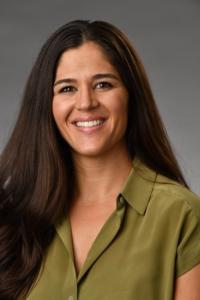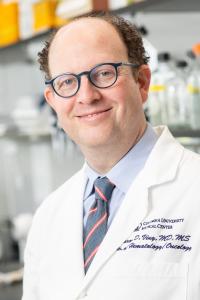Catherine Spina and Aaron Viny Win Doris Duke Clinical Scientist Development Award
Two leading early-career physician-scientists at the Herbert Irving Comprehensive Cancer Center (HICCC) have received a 2022 Clinical Scientist Development Award by Doris Duke Charitable Foundation. Catherine Spina, MD, assistant professor of radiation oncology at Columbia University Vagelos College of Physicians and Surgeons (VP&S), and Aaron Viny, MD, assistant professor of medicine at VP&S, join a class of 16 recipients recognized for research that has the potential to advance the prevention, diagnosis and treatment of human disease.
Dr. Spina’s funded project is testing the combination of novel drugs blocking the adenosine signaling pathway combined with immunotherapy and ablative irradiation [highly focused radiation treatment] for men with low volume, or oligometastatic, prostate cancer. Dr. Spina and collaborators aim to understand what drives radioresistance in some patients, and develop a therapeutic strategy to improve outcomes and delay initiation of hormonal therapy.
Dr. Viny’s project, co-funded by a prestigious Clinical Investigator Award by Damon Runyon Cancer Research Foundation, is addressing relapse in patients with acute myeloid leukemia (AML), a difficult-to-treat bone marrow and blood cancer. Dr. Viny and his lab are investigating the use of hypomethylating agents to treat AML that targets mutated genes responsible for adding or removing single carbon methyl groups to DNA. Building on prior research that found that these and other related mutations affect the 3D structure of the DNA in the leukemia cell, the Viny lab is further investigating whether the changes in the 3D structure are contributing to relapse in AML patients being treated with hypomethylating agents and to determine more effective therapies for AML.
Drs. Spina and Viny will each receive grants of $495,000 over three years.
“I am humbled, excited, and ever more motivated to continue to drive translational science that will have a meaningful impact on our patients' lives,” says Dr. Spina.


